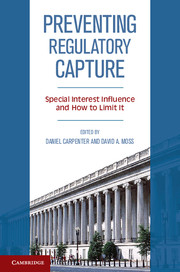Book contents
- Frontmatter
- Contents
- List of Figures
- List of Tables
- Editors
- Contributors
- Preface
- Acknowledgments
- Introduction
- Section I Failures of Capture Scholarship
- Section II New Conceptions of Capture – Mechanisms and Outcomes
- Section III Regulatory Case Studies
- Section IV The Possibility of Preventing Capture
- Conclusion
- Afterword
- Index
- References
Afterword
Published online by Cambridge University Press: 05 June 2014
- Frontmatter
- Contents
- List of Figures
- List of Tables
- Editors
- Contributors
- Preface
- Acknowledgments
- Introduction
- Section I Failures of Capture Scholarship
- Section II New Conceptions of Capture – Mechanisms and Outcomes
- Section III Regulatory Case Studies
- Section IV The Possibility of Preventing Capture
- Conclusion
- Afterword
- Index
- References
Summary
For the most part, our country's regulatory framework serves the public interest well. It helps keep Americans safe from pollutants, personal injury, and other harms and supports the orderly operation of a dynamic economy. Yet the threat of regulatory capture is ever present. When powerful interests gain excessive influence over regulatory agencies, the integrity of the regulatory process is compromised, and catastrophic consequences can unfold.
The concept of regulatory capture is well established in economic, regulatory, and administrative law theory, appearing in the research of Nobel Laureate George Stigler, the writings of President Woodrow Wilson, and contemporary commentary by conservative as well as liberal columnists. Continued research and public attention to the issue are critical as the world becomes increasingly developed and interdependent. To that end, this volume represents an important step toward a better understanding of what regulatory capture is and points to ways it may be constrained.
Highlighted in the chapters are a variety of opinions about the causes and nature of regulatory capture within government agencies. As legislators (one former), we add an emphasis on the challenges of crafting statutory approaches that enable effective regulation and are conducive to regular oversight to ensure that regulations work as intended. We begin with seven key propositions about regulatory capture. We then touch on the implication of regulatory failures during recent financial crises and note several potential remedies to the capture issues involved.
Information
- Type
- Chapter
- Information
- Preventing Regulatory CaptureSpecial Interest Influence and How to Limit it, pp. 467 - 474Publisher: Cambridge University PressPrint publication year: 2013
